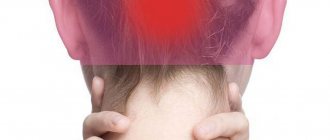Causes of headaches, nausea and dizziness
Headache and dizziness are often accompanied by nausea. The centers of these sensations are located close to each other in the brain. Acute pain often leads to loss of balance, loss of coordination, and nausea. It is important to determine what caused these symptoms - information will allow you to prescribe the correct and most effective treatment.
Migraine
Migraine is an acute headache that occurs in attacks and occurs without a specific reason. Its characteristic feature is the “migraine aura”, which is felt several hours before the onset. Most patients who regularly suffer from migraines can determine the imminent onset of an attack by characteristic precursor symptoms:
- nausea, vomiting;
- dizziness, sudden loss of balance;
- increased sensitivity to bright light and sounds;
- in some cases - speech impairment, memory loss.
If you often feel dizzy, dizzy, or feel nauseous, this may indicate a migraine. The disease is often hereditary, and in some patients it occurs after injuries and bruises. For treatment, specific drugs are prescribed to strengthen blood vessels and relieve acute pain.
Metabolic disorders
Symptoms such as headache, nausea, dizziness can occur with systemic diseases. They are accompanied by other symptoms or occur independently. A more detailed diagnosis may reveal the following disorders:
- diabetes;
- pathologies of the thyroid gland, including its inflammatory diseases and neoplasms;
- diseases of the stomach and intestines: ulcers, inflammation of the mucous membrane.
A thorough examination is important for prescribing the correct treatment. Taking medications that only relieve symptoms will not help you feel better, but will only make the situation worse. If a patient often has a headache, and dizziness and nausea appear as accompanying symptoms, the cause may lie in dysfunction of the internal organs.
Hearing diseases
Diseases of the inner ear are accompanied by severe headaches, nausea, dizziness, and deterioration of well-being. They pose a great danger because they progress quickly. If treatment is incorrect or untimely, there is a risk of complete hearing loss.
- Meniere's disease is a specific pathology in which an increased amount of endolymph is produced in the inner ear. The liquid puts pressure on the structures of the hearing organ, which is manifested by nausea, headache, dizziness, and impaired coordination of movements. Characteristic symptoms are a sharp decrease in hearing in one or both ears, auditory hallucinations.
- Vestibular neuritis is inflammation of the vestibular nerve. Most often, the disease is of viral origin, less often associated with a bacterial infection or allergy. Neuritis is manifested by an acute headache, but there is no hearing impairment.
- Labyrinthitis is an inflammation of the inner ear. The disease is a complication of otitis media and develops if it is not treated in a timely manner. Labyrinthitis causes symptoms such as nausea, dizziness, weakness, headache, as well as hearing loss and tinnitus. Purulent discharge from the ear canal may be observed.
- A perilymphatic fistula is a damage to the septum between the middle and inner ear. The liquid contents of the inner ear penetrate into the middle section. The condition is very dangerous and can lead to unilateral hearing loss.
It is important to understand that diseases of the inner ear are not always accompanied by hearing impairment. Often the patient simply has a headache and dizziness, nausea, weakness and fever. When diagnosing, one should not exclude the possibility of damage to the organ of hearing, even if there are no typical complaints of pain and tinnitus.
Arterial hypertension
High blood pressure is a common disorder for both older and younger people. Its causes include weakness of blood vessels, a decrease in the strength and elasticity of their walls. The disease is chronic and manifests itself in attacks. At home, you can always measure blood pressure using a tonometer if the following symptoms occur:
- nausea, vomiting, dizziness, headache;
- deterioration in coordination of movements;
- redness of the skin and mucous membranes;
- heart rhythm disturbance.
Attacks of arterial hypertension can be triggered by stress, high tension, physical exertion, as well as sudden changes in weather conditions. If they are moderate, they go away after a long rest. If your health suddenly deteriorates, it is important to immediately seek medical help, since hypertension in combination with weakness of the vascular walls can cause a stroke.
Vertebro-basilar insufficiency
Vertebro-basilar insufficiency is a dangerous syndrome in which brain function is disrupted due to insufficient blood flow in important arteries (basilar or vertebral). Blood does not flow to the nerve cells, so they cannot function normally.
Vertebrobasilar insufficiency is manifested by the following symptoms:
- headache, nausea, dizziness, weakness;
- short periods of vision loss, the appearance of black dots and circles before the eyes;
- sudden hearing loss, tinnitus;
- constant weakness and fatigue, possible fainting.
The disease can be congenital or acquired, and is often hereditary. Its causes in adulthood include damage to the cervical spine, atherosclerosis, diabetes mellitus, and inflammatory vascular pathologies. An accurate diagnosis can only be made on the basis of MRI or CT data, since the clinical picture resembles other diseases that are accompanied by cerebral circulation disorders.
Other reasons
The causes of headaches, dizziness, nausea and weakness can be associated with various conditions and diseases. These symptoms occur in diseases of the internal organs, endocrine and cardiovascular systems. They can indicate a huge number of disorders, which can only be distinguished based on the results of diagnostic data:
- osteochondrosis of the cervical spine - a disease of intervertebral cartilage, in which they are destroyed, deformed and compress the blood vessels carrying blood to the brain;
- increased intracranial pressure - this value cannot be measured accurately, but headache, dizziness and nausea are typical symptoms;
- Tension headache is one of the most common causes and is associated with stress, physical fatigue, and prolonged exposure of the neck to an uncomfortable position;
- The cause of dizziness, nausea, and headaches in women can be early pregnancy.
Doctors at the Clinical Institute of the Brain warn that such symptoms are a reason for a more detailed examination. They may not occur frequently in a healthy person, even due to high fatigue and tension. Nausea, vomiting, dizziness, headache and weakness may indicate hidden pathologies of internal organs that progress and cause dangerous complications.
Headache and dizziness - reasons and what to do about it?
06.03.2020
There is not a single person on planet Earth who has not at least once experienced headaches and dizziness . This usually happens due to simple fatigue, a change in atmospheric pressure, or other minor reasons. But it also happens that a headache is an indicator of serious, pathological processes occurring in the body. That is why if a person notices that dizziness and pain do not go away for a long time or appear regularly, you need to consult a doctor and undergo an examination.
Main symptoms and complaints
Headache and dizziness are often accompanied by additional symptoms:
- weakness and fatigue;
- feeling of anxiety and fear;
- vomiting and nausea ;
- disturbance of night sleep;
- blood pressure surges;
- confusion and lethargy.
Often vomiting and dizziness occur at the same time. Dizziness can occur with a sudden change in body position and excessive mental or physical stress; an increased urge to urinate , pain in the temples and general weakness are also possible.
Causes
Headache and dizziness can occur under different conditions. In some cases, this is a temporary phenomenon that simply brings discomfort, but sometimes it happens that symptoms appear in serious pathologies.
Non-hazardous factors that provoke headaches and dizziness:
- sudden change in body position. If a person quickly gets out of bed, then his body does not have time to react to these changes and the brain temporarily does not receive the required volume of blood ;
- Eye fatigue can also trigger headaches and dizziness ;
- stress. During severe emotional upheavals, cortisol and adrenaline are released the blood the blood vessels . Weak blood flow and high blood pressure prevent brain from being fully saturated with oxygen;
- lack of nutrients, vitamins and minerals also lead to dizziness and pain. Such symptoms are especially often observed with a lack of carbohydrates.
Dangerous causes of headaches and dizziness:
- head injuries lead to swelling that compresses the brain ;
- atherosclerosis . on the walls of blood vessels , which interfere with the blood flow , causing dizziness , fatigue and pain;
- brain neoplasms . Tumors can put pressure on brain tissue or squeeze blood vessels ;
- arterial hypertension. Pathological disorders of the autonomic system caused by high blood pressure;
- migraine. A widespread disease characterized by pathological vasoconstriction ;
- hypotension is manifested by low blood pressure and insufficient vascular .
You should not ignore headaches and dizziness A prompt contact with a specialist will help solve the problem or even save a life.
Published in Neurology Premium Clinic
Diagnostic methods
To understand why the patient feels sick, sick, and dizzy, a full examination should be performed. Various techniques are aimed at identifying hidden pathologies that require specific treatment. During the initial examination, the doctor collects medical history data. It is important to describe in as much detail as possible under what conditions the headache begins, how often attacks occur and how long they last. To confirm the diagnosis, the following techniques may be needed:
- first of all, measuring blood pressure; the patient is also recommended to monitor it at home;
- tests to check balance, including the Romberg test (deterioration in coordination of movements is manifested by staggering in a standing position, with eyes closed, feet shifted and straight arms extended forward);
- a general blood test will indicate inflammatory processes, as well as various types of anemia;
- blood test for glucose levels;
- heart examination, which includes ultrasound diagnostics and electrocardiogram;
- tests to assess hearing and visual acuity;
- X-ray of the cervical spine;
- study of blood flow in the vessels of the neck and head - a contrast agent is used for this;
- electroencephalography - analysis of the bioelectrical activity of brain cells;
- computer or magnetic resonance imaging is the most accurate, informative way to examine the brain, including soft tissues and blood vessels, which allows you to obtain a complete image of the affected area.
At the Clinical Institute of the Brain, you can undergo a complete diagnosis and determine the causes of nausea, dizziness, and headaches. The regimen is selected individually, based on the results of the initial examination of the patient. An experienced doctor will prescribe only those studies and tests that will determine the nature of the pathology. This is the most important stage in solving the problem, since the diagnostic results allow you to select the most effective treatment regimen.
Diagnostics
If you regularly experience discomfort in your temples and dizziness, you should definitely consult a doctor. If there are signs of vascular diseases, you should make an appointment with a cardiologist; in other cases, a consultation with a neurologist is indicated. If it is not possible to measure blood pressure or the nature of the symptoms does not allow you to independently figure out which specialist’s help is needed, it is better to initially consult a therapist. A general practitioner will help determine the cause of the problem and, if necessary, refer the patient to a specialist.
Initially, a survey of the patient is carried out, during which the characteristics of pain in the temples, the circumstances of its occurrence, the type of dizziness and the nature of other symptoms present are established. The doctor must examine the patient, measure blood pressure and, if necessary, perform neurological tests, which helps narrow the list of possible causes of poor health.
For accurate diagnosis of pathology and assessment of the severity of changes, the following may be prescribed:
- X-ray of the cervical spine;
- CT scan of the brain and skull;
- MRI of the brain and cervical spine;
- CT angiography;
- Ultrasound scanning of the vessels of the neck and head;
- 24-hour blood pressure monitoring;
- electroencephalography (EEG);
- UAC, OAM.
Treatment methods
It is important to start treatment promptly if attacks occur frequently or are of high intensity. The regimen includes several steps aimed at eliminating the cause and symptoms of headaches and dizziness.
- The first stage is relief of an attack of acute pain. For this purpose, analgesics, antiemetics, and antihistamines are prescribed.
- The second stage involves systemic treatment of the underlying cause of the attacks. The doctor will select a suitable regimen to support the functioning of the gastrointestinal tract, heart and blood vessels, and endocrine glands.
- For pathologies of the cervical spine, non-drug methods are effective. Treatment methods such as massage, gymnastics, and physiotherapy may be prescribed.
- For migraines, conventional painkillers do not provide relief. After confirming the diagnosis, the doctor will prescribe medications from the triptan group (sumatriptan).
- To restore balance, a set of exercises that can be performed at home is effective. It includes turning the head while stopping the gaze at a certain point, walking with eyes closed, and standing on one leg.
If you have a headache, feel sick, feel dizzy, or feel weak, you should definitely consult a doctor and start treating the problem. The Clinical Brain Institute offers comprehensive programs for diagnosing and treating headaches. Here you have the opportunity to undergo a full examination by experienced specialists and receive the most effective recommendations. Treatment takes place under the full supervision of general and specialized doctors, using new techniques and modern equipment.
Clinical Brain Institute Rating: 4/5 — 16 votes
Share article on social networks









